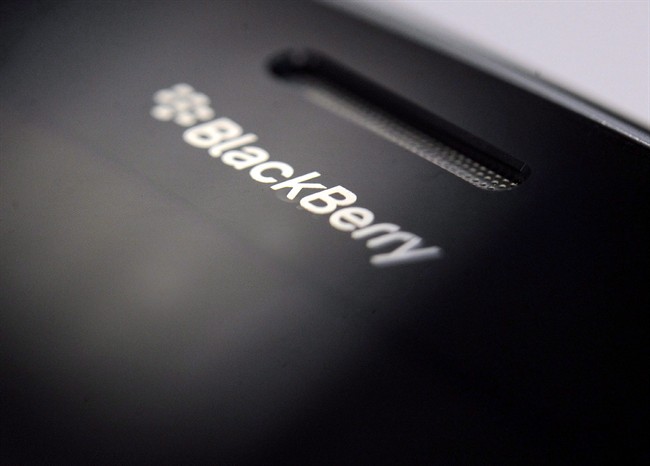TORONTO – A growing number of Canadian businesses are betting against BlackBerry as they consider how to spend their future technology budgets.

From the big banks to small retailers, uncertainty about the future of the Waterloo, Ont.-based company has left some longtime customers worried, and that has forced BlackBerry to get on the defensive about its device management infrastructure.
On Tuesday, BlackBerry (TSX:BB) announced the latest update to its Blackberry Enterprise Server, the security and management system that supports a swath of corporate and government clients. The company said numerous changes have been made that will “significantly reduce” costs for customers who have a large number of devices on the system.
The decision comes as BlackBerry watches a number of its prized corporate clients turn to other companies for similar device management support, after some complained about how expensive it was to use BlackBerry’s services.
Bank of Montreal (TSX:BMO) and Royal Bank (TSX:RY) switched part of their smartphone management systems to a competitor earlier this year.
In the United States, even more customers have opted to completely sever ties with BlackBerry, including drug giant Pfizer Inc., and the U.S. Defense Department has stopped exclusively using the company for its device solutions, as part of a contingency plan for a worst-case scenario of BlackBerry shutting down.
In a letter posted online Monday, BlackBerry’s interim chief executive urged some of its largest customers to stay with the company.
“Reports of our death are greatly exaggerated,” John Chen wrote.
He said the smartphone maker would return to its roots with a focus on business users.
But the move was more an attempt to stem the bleeding, rather than anticipate a problem.
At one time, corporate and government clients were the faithful and reliable backbone to BlackBerry’s business model, because they would sign multi-year agreements for its enterprise services, known as BES.
Over the past year, many of those contracts have come up for renewal, and after weighing cost and the growing popularity of bring-your-own-device for employees, some clients have chosen to look elsewhere.
A number of competitors have aggressively began promoting their services as an alternative to BlackBerry, including device management companies like AirWatch LLC and a similar service called Samsung Knox.
Jeff Holleran, BlackBerry’s senior director of enterprise product management, said the outflow of customers was a key reason why BlackBerry decided to open its services to support iPhone and Android devices.
“For us the move to cross-platform is to bring our customers back,” Holleran said.
“We do have customers coming back to us,” he added.
BlackBerry declined to say which clients had returned to its services, after leaving for a competitor, citing confidentiality reasons.
Keeping track of how many companies have begun to scale back on their reliance on BlackBerry is a difficult task.
Many Canadian firms have shied away from confirming whether they’ve switched to a competitor, mostly because they’re concerned about a backlash from consumers.
Earlier this fall when Rogers Communications (TSX:RCI.B) decided to forego selling the BlackBerry Z30 it faced a barrage of complaints on social media for abandoning BlackBerry in its most desperate moments. The telecom company quickly relented and sold the phone online.
A statement from BMO spokesman Ralph Marranca said the bank “will continue to use BlackBerry enterprise server for Blackberry devices and AirWatch technology for non-BlackBerry devices.”
A Royal Bank spokesman declined to confirm whether it has stopped using BlackBerry management services, though sources familiar with the bank said it has moved non-BlackBerry devices onto a competitor’s service.
However, BlackBerry has also managed to secure new agreements with many of its large corporate clients, including most recently German companies Mitsubishi Motors Deutschland, manufacturing giant Grohe AG and sugar producer Sudzucker AG in November.
BlackBerry shares closed eight cents lower at $6.72 on the Toronto Stock Exchange.



Comments